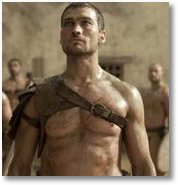 Sword and sandals epics are back
Sword and sandals epics are back
Movie technology and contemporary geopolitics have made the Ancient heroic narratives relevant once more
Somewhere in the North of Britain, AD117. A rain-sodden band of Roman soldiers from the infamous Ninth Legion bemoan their lot while keeping guard at midnight in a fort. It’s the start of Neil Marshall’s Ancient-era action movie Centurion, and the hero, Quintus Dias (Michael Fassbender) grumbles, “I know this enemy well. They will not be drawn into open combat. This is a new kind of war!”
Suddenly, the soldiers are snapped to attention by a noise from the darkness outside. It could be the dreaded savages from the local Pict tribes. It could be a Boadicea-style female assassin who is lurking in the shadows. Or it could, given the right timings and locations, be the sound of the cast and crew from another competing Ninth Legion movie, which is gaining ground near by. This one is called Eagle of the Ninth, and stars Jamie Bell, is directed by Kevin Macdonald (The Last King of Scotland), and is coming soon to a sword’n’sandals-filled cinema near you.
There has never been a better time to make a movie set in the Ancient era. Besides these two high-profile Ninth Legion films, we are also about to witness a big-budget Clash of the Titans remake that features Liam Neeson, Ralph Fiennes and $100 million worth of special effects. We’ve already had the Greek gods and teen heroes in Percy Jackson and the Olympians. Mickey Rourke, meanwhile, is starring in Dawn of War, a mortals-versus-gods adventure from the director Tarsem Singh (The Fall). Plus, the TV series Rome is being revamped for the big screen, and the hottest story in US TV right now is the explicit raunch and violence in the Gladiator-inspired series Spartacus: Blood and Sand.
...
Even Tapert, who previously worked on the high camp of Xena: Warrior Princess (his wife is the Xena star Lucy Lawless) and Hercules: The Legendary Journeys, says that the mood had changed by the time Spartacus came along. “We wanted the characters to play it 100 per cent straight, and to allow the dramatic flourishes — the sex and the violence — to be the things that would provoke the audience. We never wanted to acknowledge to the audience that they are in on a joke, which we did periodically on Xena and Hercules.”
Tapert says that he is aware that the sex and violence in Spartacus — which runs the gamut, respectively, from orgies to on-screen dismemberment — is regarded as controversial. The British pressure group Mediawatch UK is so offended that it is trying to block Spartacus from reaching our TV screens. Tapert dismisses the group, saying that its members are using the show to “fuel their own popularity and promote their own agenda”. He says: “Although we’ve pushed the boundaries of what one would normally see on television, there are ancient plaques from the houses of prostitution in Pompeii that are also pretty explicit.”

